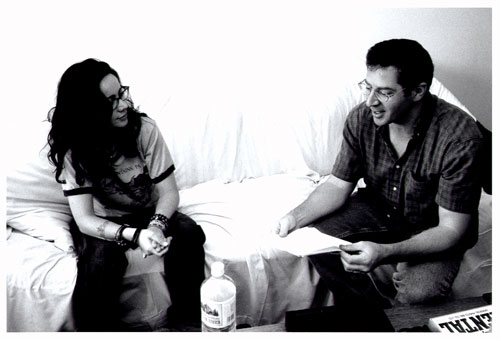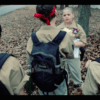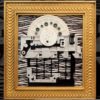
Part Comedy, Part Gangsters
Written by Dan McCallum | Posted by: Anonymous
Disco was dead, and America was looking for a hot new dose of nightlife. A fresh, untapped source of chaos was brewing in Boston nightclubs, and one night Johnny Carson gave America what it wanted, a tall-nonfat, very dry shot of Beantown’s best, Steven Wright. Boston’s stand-up comedy scene would never be the same. "When Stand Up Stood Out" traces the rise and ultimate demise of the nation’s most controversial comedy landscape.
Filmmaker and Newton native Fran Solomita may be a far cry from New England, but a part of him is still onstage telling jokes at Boston’s Comedy Connection or at Somerville’s Chinese restaurant, turned comedy hotspot, The Ding Ho. At the age of 17, Solomita began his career, traveling from club to club, night after night, living and breathing to make people laugh. He gained notoriety and went on to work in television as a comedian and actor. Solomita has been featured on MTV, HBO, Comedy Central and hosted Fox’s talk show "Liars."
Fran Solomita and producers, Chad Sahley and Curt Apanovich of Hieroglyphic Productions spent three years gathering 180 hours of footage and attended one hell of a class reunion to tell the tale of Boston’s comedy explosion.
"I was always thinking of making a fictional version of this story about a bunch of tough Irish comics that were part comedy, part gangsters. I started telling Chad and Curt stories about the things we used to do; the road gigs, the shows we did and the crowds we would encounter. They said we should make a documentary about it… I realized out of everything I’ve done over the last 22 years, the most interesting part was the beginning."
The beginning. In the early ‘80s, New York and Los Angeles were the two hotspots for comedy. "The Tonight Show with Johnny Carson" was the brass ring that every comic was struggling to obtain. In Boston, a young, die-hard group of comics were emerging. Boston stood out as a tough, blue-collar comedy scene where money and fame didn’t matter. "It was a completely open, free, and crazy atmosphere that allowed for such creative risk taking."
"When Stand Up Stood Out" features Boston’s best and brightest. Interviews and rare footage celebrating the early days of the Boston comedy scene are what really make this documentary shine. Some of the most candid and telling interviews are with those comics that got their start in Boston, including Kevin Meaney, Denis Leary, Steven Wright, Janeane Garofalo, Bobcat Goldthwait, Paula Poundstone, Don Gavin, Kenny Rogerson, Jimmy Tingle, Barry Crimmins, and the legend himself, Lenny Clarke. "Lenny was always nice to everybody, he was kinda the mayor of the comedy scene. He was really political, very powerful, charismatic and very ballsy on stage, just a balls out performer."
What was it about the Boston comedy scene? "I think it was a synergy. A serendipitous thing happened both with the movement of comedy and the fact that this was a town that had no showbiz aspirations. The comedians that came from here were just traveling to their own beat. They weren’t following any rules about what to wear on stage. They weren’t following any rules about what to say onstage and as a result some people emerged as really original and some others were just loud and crazy but either way it was just really refreshing."
Loud and Crazy. The Barracks was a frat house party place that housed many of the local comics and acted as a guest room to many visiting out-of-towners. Out-of-control loud parties helped create a fraternity-like atmosphere that strengthened the bond between comics. Helping mold Boston’s unique scene was upstate New York comic Barry Crimmins, who came to Boston and set up shop in a Somerville restaurant called The Ding Ho. Hosting some of the most raucous and smart talent in Boston, The Ding Ho was "an after hours club for the comedy mafia." Everyone knew The Ding Ho and Barry Crimmins. It was a no-holds barred, balls to the wall place unrivaled by any other comedy club in America. The Ding Ho was a landmark.
"Tonight Show" producer Peter Lassally called The Ding Ho and asked to see a bunch of local comics while he was in town. As a result, Steven Wright nabbed the brass ring. In 1982 he became the first Boston comic to grace "The Tonight Show" stage and he unleashed a frenzy that catapulted Boston comics into the national spotlight. "Steven opened the flood gates… Stand-up was a giant cash cow but more than anything, Boston was a city where people that were medium level comedians like myself could make $600-$1000 working 6 nights a week." Solomita describes that time period as "an orgy of cabbage and comedy."
By the mid to late ‘80s, stand-up was everywhere. Some local comedians became household names and others retained local success. Cable channels were giving comics the exposure they only dreamed of. But, it soon turned into a medium where anyone could be a great comedian between commercial breaks.
"On a nation level, there was too much television. I think that what we all thought would save us, ended up burning us. The cable TV explosion! People didn’t need to leave their homes anymore. They wouldn’t have to pay $10. They wouldn’t have to deal with traffic and loud rowdy audiences anymore. As fun as it is on TV, it’s not like going to a club, something that was so fun and crazy. It used to be special, taking the subway to Boston Common alone in 5-degree weather, doing a club and feeling like you were a beat poet or a storyteller. There wasn’t much of a vibe over it. When the vibe took over, with the money and the clubs, as great as it was financially and exciting as it was, it started to be diluted."
As the film states, "Excess, success and clashing egos" helped bring the brotherhood of Boston comedy to its knees. "We all took part in [the overexposure], we all did those shows thinking it was going to continue the way it was," says Solomita. "You have to wonder, why did I get into this originally? I got into this because I like to make people laugh and because its fun. But when you start to hear them laugh and then you start to get paid to make them laugh it starts to become a business. And that was the hard part because you’re not experimental. It becomes competitive and all that shit."
"Here’s what I felt I owed to the comics. It could have been about Fran’s journey, but it would have been more of a one-man show movie. Then I thought I’m going to tell the story the way it really happened to the best of my ability and from my perspective and not muddle it with my opinions. Then the audience and the comics will see that I did the best I could telling the story," says Solomita. "And that’s what I owed to the comics; I tried to be truthful. I said that certain people were jealous, certain people were successful, certain people did a lot of drugs, certain people didn’t do drugs. Certain people were fighting over money; I tried to let people talk for themselves. I could have been a little more sensational with things here and there but I didn’t want it to be an "E! True Hollywood Story."
"The audience response has been nice and flattering. So far we’ve screened it at the New England Film and Video Festival and the Boston Comedy Festival. It’s a very universal story about loyalty. Hopefully the focus on the friendships and camaraderie, taking care of each other, sticking up for each other makes it universal." The comics featured in the documentary have had a positive response as well. "Kevin Meaney was blown away, Lenny Clarke just hugged me and told me he wouldn’t change a god damn thing. Dennis Leary was beside himself… The response has just been unbelievable."
Three months into shooting the film, a benefit was organized for Ding Ho founder, Barry Crimmins. Reuniting these alumni, these class clowns, created a bittersweet ending to this funny and touching documentary. "This film was a right of passage. My film is about a group of people in a little town that wanted to make people laugh in a crazy time. I love my past; I love my life. Sure I wish there were things that turned out differently, I wish I was as big as a Jon Stewart but I’m not, so… maybe if I had been as big as that, I might not have made the film. That’s a big thing, I made a film!"
'When Stand Up Stood Out' screens at the Woods Hole Film Festival, which takes place on July 26-August 2. For more information, visit www.woodsholefilmfestival.com. See www.standupmovie.com for more information about the film.










